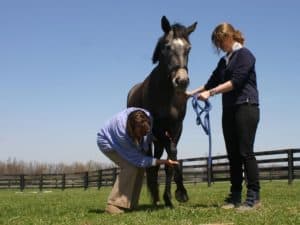Treating Guttural Pouches in Foals: An Easier Way (AAEP 2010)
- Topics: Article
Instead of operating on a foal with guttural pouch tympany, veterinarians should consider placing a flexible tube through the opening of his guttural pouch(es) via the nasal passage, according to a veterinarian from Auburn University.
Guttural pouches are air-filled outpouches of the auditory system (Eustachian tube) that connects the pharynx (throat) to the inner ear. In foals with guttural pouch tympany, air cannot exit these pouches normally. Instead, air continuously enters the pouches but remains trapped inside.
"Usually, guttural pouch tympany is noted soon after the foal is born," explained Elizabeth Barrett, DVM, a surgical resident at Auburn’s Vaughan Large Animal Teaching Hospital, who presented a study on the subject at the 2010 American Association of Equine Practitioners Convention, held Dec. 4-8 in Baltimore, Md. "Affected foals develop a large uni- or bilateral swelling in the throatlatch area."
Foals with guttural pouch tympany can suffer respiratory distress and can aspirate milk when nursing, causing pneumonia. The condition can be managed surgically; however, surgery typically requires special skills and equipment
Create a free account with TheHorse.com to view this content.
TheHorse.com is home to thousands of free articles about horse health care. In order to access some of our exclusive free content, you must be signed into TheHorse.com.
Start your free account today!
Already have an account?
and continue reading.

Written by:
Stacey Oke, DVM, MSc
Related Articles
Stay on top of the most recent Horse Health news with












